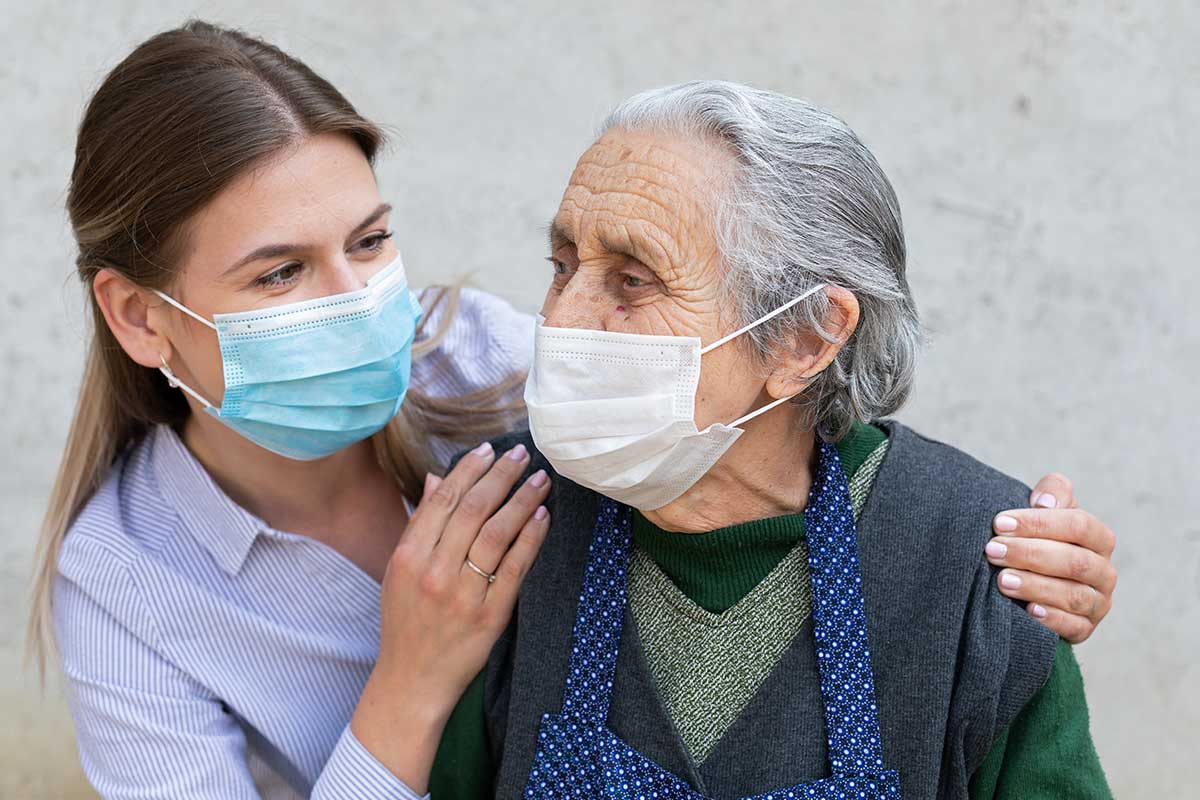
In 2011, more than one in six Americans reported being a full-time or part-time caregiver to a loved one, family member, neighbor or friend. Ages of the caregivers ranged from young to middle-aged, and a majority of caregiving individuals reported working full time, on top of offering a minimum 15 hours per week of care for the care-receiver.
And, during COVID-19, as the elderly population faces an increased risk of infection at nursing homes, assisted care facilities and exposure to other family members at home, caregiving has quickly become more challenging, whether near or far. Extra safety precautions have been put in place, public outings have stopped and check-ins with physicians and specialists have moved online.
“This is a really stressful time for caregivers,” says Kathleen Cameron, senior director of the Center for Healthy Aging at the National Council on Aging. “Caregiving itself can be very stressful and isolating, so the pandemic has just added to that feeling of isolation.”
If you or someone you know is a caregiver during COVID-19, Cameron has a few tips to adjust to the era of COVID-19 and its challenges, whether your care-receiver is in the bedroom upstairs, or staying at a long-term senior living facility. Find highlights from our conversation below.
How should caregivers maintain their own health and well-being during COVID-19?
I think the first thing that caregivers need to do is really take care of themselves. They need to stay as healthy as they can during this period of time so that they can take care of their loved ones. First and foremost is following the Centers for Disease Control and Prevention’s guidelines on social distancing and hand-washing, wearing masks when going out, those sorts of things. But other things that caregivers need to do are engage in activities that are going to keep them as healthy as possible and boost their own immune systems. For example, eating right and preparing nutritious meals for both themselves and their care-recipient, and making sure they stay hydrated. Exercise and sleep are also really important for maintaining health during this period of time, and I think getting outside and getting fresh air; sunlight is so beneficial to both our physical and mental health. Taking your care-recipient out for walks is also really important.
One other thing caregivers need to recognize is that they’re not alone. It’s really important for caregivers to have a support network. I’ve heard it called a “care squad.” It could be a group of neighbors, family members or friends who can help out picking up prescription medication, going to the grocery store and more. Don’t be afraid to ask for help from those around you. It helps to have those you can count on as much as possible with all of the demands that a caregiver has, particularly now.
Lastly, have a backup plan if anything should happen. For example, if the caregiver themselves becomes sick, with either COVID-19 or something else, you should have a backup plan for someone else to resume the caregiving responsibilities, such as a family member, friend or neighbor, and create that plan early on, just in case.
For those who are caregving from afar, what should they be doing to care from a distance?
Certainly one of the things is staying in very close contact with the individual in the long-term care setting, whether it’s assisted living or a nursing home, if that’s possible. Having your family members and friends stay in contact with the loved ones as much as possible in those communities is really critical. Also, staying in close contact with the staff and maybe finding one or two staff people who you have a good rapport with and feel that they’re giving accurate, timely information is really important. A lot of communities are now doing e-newsletters to family members to keep them up to date. But if a caregiver isn’t getting that regular information from the care facility, they should demand it.
If they are continuing to reach out for information and are concerned about limited access, they can reach out to a long-term care ombudsman, which can be volunteers or paid individuals who really watch out for the rights and needs of the long-term care residents. Fortunately, in the CARES Act signed by Congress, there was some new money that was put in places for these ombudsman members at care facilities across the country.
Lastly, to the extent that it is possible, family members and caregivers should get to know other family members of residents in the long-term care facility, support each other and share information. I think that’s really important because sometimes, one family will find out information that’s not necessarily being shared with others, so having that kind of support network across families is really great too.
Aside from the hardships many are facing, especially in the senior communities, what positives do you see coming out of the global pandemic for older adults?
I feel like we’re seeing people really coming together and helping others through the pandemic. There are so many neighborhood groups that are being formed to help out low-income families, older adults or for people with disabilities. But I also think this pandemic has exposed a lot of problems in our health care system and our long-term health care systems, inequities of certain racial and ethnic groups, for example, which those of us working in the health care system have known about for a long time, but it’s really brought to light some of those problems. I also think more seniors are going to have access to technology. They’re going to have access to programs and services that can serve their needs, especially because we’ve had to be so creative at this time. I work with a lot of community-based organizations that provide in-person programs, physical activity, exercise programs and senior centers that are done in person while we’re working on ways to deliver these programs to older adults no matter where they are. I’m hopeful that now that there’s greater awareness and understanding of these issues, that things are going to be better on the other side. We certainly have to have the political will to support new initiatives, but I really think we are going to see a brighter light once the pandemic is over.
For more articles like this one sent straight to your inbox, subscribe to our Senior Living newsletter.




